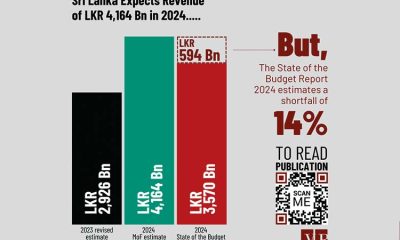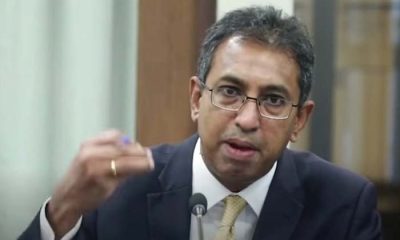News
Sri Lanka’s book publishing industry faces crisis as 18% VAT sparks job losses and closures

By Rathindra Kuruwita
Thousands of jobs in Sri Lanka’s book publishing industry will be lost due to the imposition of VAT (18%) on books publishers claim.They claim that about 30 percent of bookshops have been closed due to the economic crisis.
There had been no taxes on books before 01 January 2024, Sri Lanka Book Pub lish ers Asso ciation (SLBPA), President Samantha Indeewara, said.The book publishing industry was in crisis even before the imposition of VAT, he added.
“The prices of all raw materials have increased. For example, the price of paper has risen by 300 percent in the past few years.”
“Books and stationery prices will increase by more than 20 percent. The income of parents has not risen. What will they do? Children’s education will suffer.”
Indeewara said Sri Lanka imported at least 90 percent of the inputs needed to produce a book. All of them were subjected to VAT and other import duties.”However, the final product was not subjected to VAT earlier.”
Indeewara said book sales had dropped in the 1990s, with the spread of electronic media. Book publishers started the Colombo International Book Fair to reverse the trend.
“But in recent years, book sales have dropped again because of the economic crisis.
SLBPA former President Vijitha Yapa said that when Ranil Wickremesinghe was Prime Minister in 2002, he proposed a tax on books. However, the government had withdrawn the proposals due to protests from the book publishers.
“In 2016, Wickremesinghe again attempted to impose a tax on books. When Wickremesinghe came to the Colombo International Book Fair that year, as the Chief Guest, we again urged him not to impose a tax. The proposal to impose taxes on books was again withdrawn,” he said.
Yapa mentioned that in September 2023, they had heard the government was planning to impose VAT on books. The book industry representatives met the President and inquired about the possible tax.
“The President said nothing was set in stone and that we would have an opportunity to discuss the matter. He told us that the IMF wanted him to impose a tax on books.”
Despite the assurances, the book industry didn’t get an opportunity to discuss the impending taxes with the government, he said. The industry representatives wrote to the President, and his chief of staff, Sagala Ratnayake, said he would inform the President.
“Later, we were asked to talk to the IMF. Then we wrote to the IMF. It has been two months; there has not been a reply from the IMF.”
Yapa said that from what he knows, no other South Asian nation has imposed VAT on books.
“Some publishers only print about 500 copies of a book,” he added. “Earlier, we used to print thousands of copies. Prices of books are now high because we print less. There are no economies of scale. Printing books is so expensive here that people actually print books abroad and bring them here. It’s cheaper for them to pay import taxes than to print in Sri Lanka. Thousands of jobs will be lost.”
Yapa went on to say that 30 percent of bookshops have closed down already, and more shops will go out of business soon.
“We don’t know how much the government is trying to make by taxing us. We don’t know, and they won’t tell us.”
President of the Ceylon Booksellers Importers And Exporters Association, Dinushi Abeywickrama, said the text books they import for students sitting for foreign exams have tripled in price.
“Families with a few kids are seriously affected by this. Parents can’t buy. Earlier, parents used to come and buy the entire set of text books for their kids. Now they buy these books on a staggered basis. Most parents try to see if they can get the text book photocopied,” she said.
The government is violating the Agreement on the Importation of Educational, Scientific and Cultural Materials (also known as the Florence Agreement), she said.
Abeywickrama added this is a 1950 UNESCO treaty whereby states agree to not impose customs duties on certain educational, scientific, and cultural materials that are imported.
“We are a party to that agreement,” she said, adding that the President is a well-read person and that he has used the knowledge he has gained from reading to make a name for himself in the world.
“I, therefore, urge him not to deprive other people from learning and improving themselves by reading books,” she said.
News
US sports envoys to Lanka to champion youth development

The U.S. Embassy in Colombo welcomed the U.S. Sports Envoys to Sri Lanka, former National Basketball Association (NBA) and Women’s National Basketball Association (WNBA) players Stephen Howard and Astou Ndiaye, from June 8 through 14.
The Public Diplomacy section of the U.S. Embassy said that it would launch a weeklong basketball program intended to harness the unifying power of sports, made possible through collaboration with Foundation of Goodness and IImpact Hoop Lab.
While in Sri Lanka, Howard and Ndiaye, both retired professional basketball players, will conduct a weeklong program, Hoops for Hope: Bridging Borders through Basketball. The Sports Envoys will lead basketball clinics and exhibition matches and engage in leadership sessions in Colombo and Southern Province for youth aged 14-18 from Northern, Uva, Eastern and Western Provinces, offering skills and leadership training both on and off the court. The U.S. Envoys will also share their expertise with the Sri Lanka Basketball Federation, national coaches, and players, furthering the development of basketball in the country. Beyond the clinics, they will collaborate with Sri Lankan schoolchildren to take part in a community service project in the Colombo area.
“We are so proud to welcome Stephen and Astou as our Sports Envoys to Sri Lanka, to build on the strong people-to-people connections between the United States and Sri Lanka,” said U.S. Ambassador Julie Chung. “The lessons that will be shared by our Sports Envoys – communication, teamwork, resilience, inclusion, and conflict resolution – are essential for leadership development, community building, equality, and peace. The U.S. Sports Envoy program is a testament to our belief that sports can be a powerful tool in promoting peace and unity.”
News
Rahuman questions sudden cancellation of leave of CEB employees

SJB Colombo District MP Mujibur Rahuman in parliament demanded to know from the government the reasons for CEB suspending the leave of all its employees until further notice from Thursday.
MP Rahuman said that the CEB has got an acting General Manager anew and the latter yesterday morning issued a circular suspending leave of all CEB employees with immediate effect until further notice.
“We demand that Minister Kanchana Wijesekera should explain this to the House. This circular was issued while this debate on the new Electricity Amendment Bill was pending. There are many who oppose this Bill. The Minister must tell parliament the reason for the urge to cancel the leave of CEB employees,” the MP said.However, Speaker Mahinda Yapa Abeywardena prevented Minister Wijesekera responding to the query and said that the matter raised by MP Rahuman was not relevant.
News
CIPM successfully concludes 8th Annual Symposium

The Chartered Institute of Personnel Management (CIPM) successfully concluded the 8th Annual CIPM Symposium, which took place on 31st May 2024. Themed “Nurturing the Human Element—Redefining HRM in a Rapidly Changing World,” the symposium underscored the pivotal role of human resource management (HRM) in today’s dynamic global landscape. Since its inception in 1959, CIPM has been dedicated to advancing the HR profession through education, professional development, and advocacy, solidifying its position as Sri Lanka’s leading professional body for HRM.
Ken Vijayakumar, the President of the CIPM, graced the occasion as the chief guest. The symposium commenced with the welcome address by the Chairperson, Prof. Arosha Adikaram, followed by the Web Launch of the Symposium Proceedings and Abstract Book by the CIPM President. The event featured distinguished addresses, including a speech by Chief Guest Ken Vijayakumar, President of CIPM, and an address by Guest of Honor Shakthi Ranatunga, Chief Operating Officer of MAS Holdings Pvt. Ltd., Sri Lanka.
The symposium also featured an inspiring keynote address by Prof. Mario Fernando, Professor of Management and Director of the Centre for Cross Cultural Management (CCCM) at the University of Wollongong, Australia.
Vote of Thanks of the inauguration session was delivered by Dr. Dillanjani Weeratunga, Symposium Co-chair.
The symposium served as a comprehensive platform for researchers to present their findings across a wide range of critical topics in HRM. These included Cultural Diversity and Inclusion, Talent Development and Retention, Ethical Leadership and Corporate Social Responsibility, Adapting to Technological Advancements, Mental Health and Well-being at Work, Global Workforce Challenges, Employee Empowerment, and Reskilling and Upskilling.
The plenary session was led by Prof. Wasantha Rajapakse. Certificates were awarded to the best paper presenters during the valedictory session, followed by a vote of thanks delivered by Kamani Perera, Manager of Research and Development.
The annual symposium of CIPM was a truly inclusive event, attracting a diverse audience that spanned undergraduates, graduates, working professionals, research scholars and lecturers. This widespread interest highlights the symposium’s significance in the field of HRM, offering a unique opportunity for everyone to network and learn from scholarly brains.The CIPM International Research Symposium was sponsored by Hambantota International Port, Sri Lanka Institute of Information Technology (SLIIT), E B Creasy & Co. PLC, and Print Xcel Company.
























